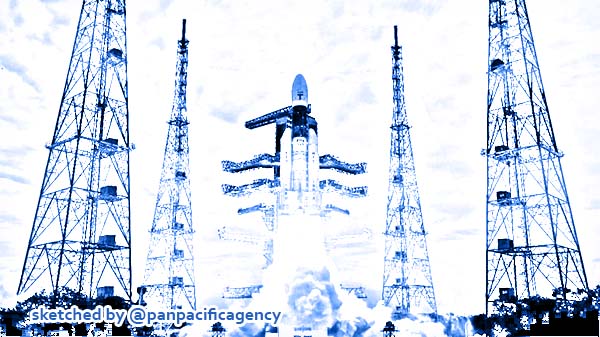Indian rocket suffers catastrophic failure during launch

Chandrayaan-2 took off from the Satish Dhawan Space Centre in Sriharikota on July 22 (Photo: Twitter/Isro). Sketched by the Pan Pacific Agency.
NEW DELHI, Aug 12, 2021, Space.com. India’s first launch of 2021 has ended in failure, Space.com reported.
An Indian rocket carrying a new Earth-observation satellite for the Indian Space Research Organisation (ISRO) suffered a catastrophic failure shortly after launching early Thursday (Aug. 12) from the country’s Satish Dhawan Space Centre on Sriharikota Island in eastern India. The liftoff occurred at 5:43 a.m. local time in India (8:13 p.m. EDT Aug 11/0013 GMT).
The launch failure, the first for India since 2017, occurred sometime past the six-minute mark after the mission’s rocket, the 12-story-tall Geosynchronous Satellite Launch Vehicle, had ignited its cryogenic third stage.
The launch “could not be fully accomplished” because of a “technical anomaly observed in the cryogenic stage, ISRO chair K. Sivan said in a brief televised statement after the failed mission.
Lost with the GSLV rocket was the EOS-03 Earth observation satellite designed to be a “state-of-the-art” tool for ISRO to study our planet. The satellite was expected to last at least 10 years working to provide near real-time images of India, track natural disasters and other short-term events and collect data to assist agriculture and forestry by monitoring crop health, according to an ISRO mission description.
The GSLV launch failure breaks a streak of 14 successful launches for ISRO, the launch tracking site Spaceflight Now reported. It began after the the 2017 failure of a different Indian rocket, a smaller Polar Satellite Launch Vehicle, carrying a satellite for the Indian Regional Navigation Satellite System. That 2017 failure was the first in 20 years for India’s PSLV, according to SpaceNews.
The last year has been a trying one for India’s space program.
After the launch of EOS-01 in January 2020, the country’s launches were placed on hold during the early days of the COVID-19 pandemic. The resumed late that year with two missions, one each in November and December. That November launch successfully placed the EOS-01 Earth observation satellite into orbit.
The delays from the pandemic prompted ISRO to move the launch of EOS-03 ahead of the EOS-02 mission, originally targeted to fly in March 2021, according to a report by the Indian Express news site. That mission had been rescheduled for no earlier than September and ISRO had planned to launch at least four more missions by the end of 2021, the report stated.
All five of those missions will likely be on hold as ISRO investigates the cause of the GSLV launch failure.